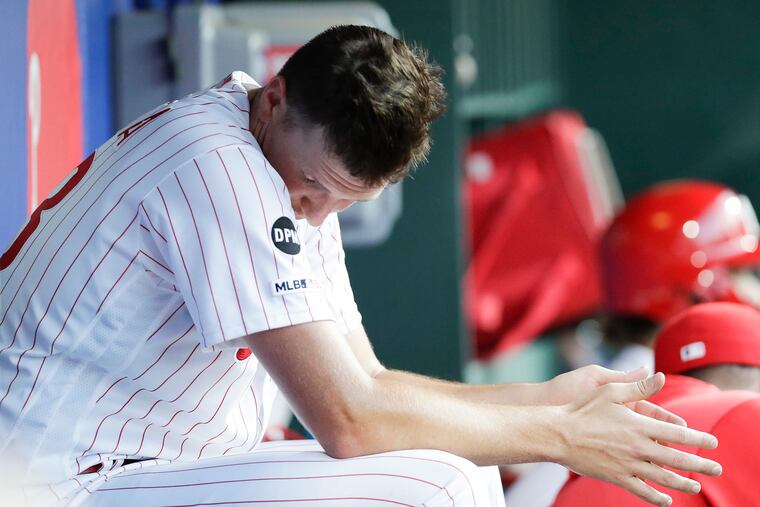Phillies are all-in this season, except they aren’t | Bob Ford
The front office appears to be playing for next season already.

The Phillies organization finds itself caught between what the front office says it wants to be and what it is willing to do in order to get there.
This was the season of going all-in for the franchise, the season of John Middleton’s “stupid money,” and the issuance of $470 million in contracts after 2018’s gloomy finish.
Everyone congratulated the Phillies for the bold strokes of Middleton’s pen, and the organization accepted every word of it. At the time, they even seemed to believe it. This was a team that would swing for figurative as well as literal fences, and accept the risk that comes with it.
I’m not entirely sure where that organization has gone, but after a half season of tepid baseball, the reckless bravado of spring has been replaced by the worried caution of summer.
The Phillies are certainly free to pursue their goals in any way they like, but it would be nice if they just picked a lane.
At the All-Star break, it was true they had already played themselves out of logical contention for the division. Going into Monday’s games, the Braves were on a pace to win 98 games, which would require a 50-19 finish for the Phillies to match.
There is still the wild-card race, but the Phillies are just one of 11 NL teams bunched between 42 and 49 wins. Pulling away from that pack would be possible with some upgrading of the pitching, but team president Andy MacPhail made it clear he won’t jeopardize the future for the thin hope of a single-elimination play-in game and then, if they survive, an opening series against the Dodgers.
“[It’s] hard for us to make the judgment now that we’re one trade away from the World Series,” MacPhail said after the break. “From my perspective, you have to be a bit more judicious with your playing talent if you think you have a longer haul to get to the postseason.”
In other words, the team that was all-in so recently has gotten out, at least as far as this season is concerned. The message to fans couldn’t be clearer: We don’t believe this team is fixable now without ransacking the farm system, and that isn’t going to happen. But enjoy yourself, and please keep buying those tickets.
It is old ground to observe that the bind the Phillies are in is entirely of their own making. They have had bad luck with bullpen injuries – man, who could have figured Tommy Hunter would be on the injured list for a fourth straight season? – but the failure to upgrade the starting rotation during the offseason has been their real undoing.
Jake Arrieta, currently pitching with a discomforting bone spur in his elbow, finished 2018 by going 1-5 with a 6.35 earned run average in his last nine starts. Nick Pivetta had one win in his last 13 starts. Vince Velasquez had a 5.68 ERA after the All-Star break. And Zach Eflin, who held hitters to a .233 average and .650 OPS before the break last year, was tagged at a .290 and .847 pace afterward.
» BOB BROOKOVER: Jake Arrieta’s signing hasn’t been as bad as you might think
So, it’s not as if the organization should have gone into the offseason brimming with confidence in the starters, although that is exactly what the front office kept saying all the way through spring training.
Well, they’re not saying it any more. The staff has allowed the most home runs in the National League, is second-to-last in strikeouts, and is last in Fielding Independent Pitching.
What the Phillies don’t want to do is lose a top prospect like Spencer Howard or Adonis Medina in pursuit of a short-term upgrade for limited reward this season, and that is understandable.
What they also don’t want to do, apparently, is explore next season’s free-agent market a half-year early. That is really where they could satisfy all of their objectives – improve the rotation for the future, keep their best farm products, and have the added bonus of reviving interest in the current season.
There are a number of starters who will be free agents next season, and some of them are on teams that might doubt either their ability or willingness to re-sign them. Just throwing out names, there are guys like Madison Bumgarner of the Giants, Jake Odorizzi of the Twins, Zack Wheeler of the Mets, and Gerrit Cole of the Astros.
The list is longer, but the idea is that all of them represent an upgrade over what the Phillies have now. They are pitchers who could be acquired for reasonable output as their teams prefer getting something over nothing, and would make sense if willing to sign longer-term deals. The Phils shouldn’t approach this as a rental market but something more like a lease market.
If they want to walk the walk, which the Phils appeared to do as recently as March, then they can’t come to a stuttering halt just four months later. A couple of large contracts to pitchers would push them into paying the competitive balance tax for the first time in team history, but this isn’t an organization that should start pinching pennies now.
Listen to the front office, however, and there is no sense that it will throw caution and money to the wind at the trade deadline. They are correct that it can be blown into their faces quickly, but are so far ignoring the possibility that it can also fill their sails and carry them back to being who they claimed to want to be.
Get insights on the Phillies delivered straight to your inbox with Extra Innings, our newsletter for Phillies fans by Matt Breen, Bob Brookover and Scott Lauber. Click here to sign up.